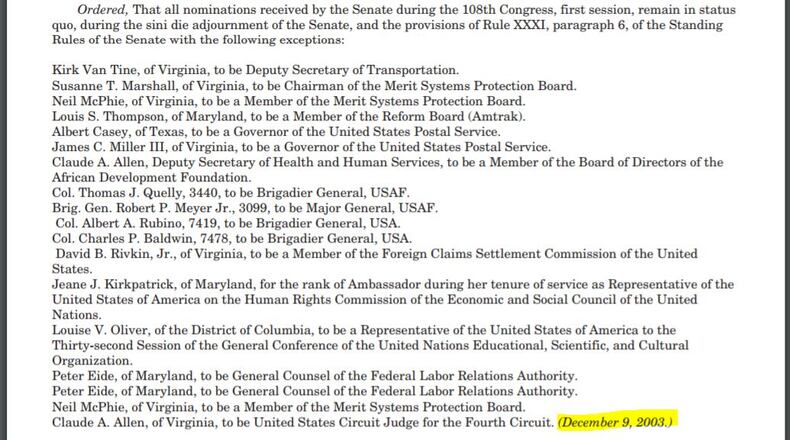Caught up in an increasingly polarized battle over nominations in the U.S. Senate, four Georgians selected by President Donald Trump - two for federal judgeships, one for ambassador, and one Executive Branch position - had their nominations returned this week, forcing the White House to either resubmit those choices, or find others for the jobs in 2018.
"I wish they would fight for it just on principle," said former Georgia GOP Congressman Lynn Westmoreland, who was chosen for the Amtrak Board of Directors, but saw his nomination returned by the Senate.
Now Westmoreland will wait and see if he gets picked again.
"It's up to them," he said of the White House and Trump Administration.
Along with Westmoreland, the three other nominees from the state now in limbo are:
+ William M. Ray II, nominated to be a federal judge in the Northern District of Georgia;
+ Elizabeth L. Branch, chosen for the Eleventh Circuit Court of Appeals;
+ James Randolph Evans, selected for the post of Ambassador to Luxembourg.
Those four Georgians - all of whom had been through confirmation hearings in recent months - were part of a larger group of 100 nominations sent back, as the Senate wrapped up work for the year.
While no one knows for sure who objected to the individual nominations - the Senate does not release that information - the feeling in the halls of the Capitol was clear, that most of these moves were probably made by Democrats, already at odds with President Trump on a number of fronts, especially over nominations.
At issue is a Senate rule XXXI, which plainly states that "Nominations neither confirmed nor rejected during the session at which they are made shall not be acted upon at any succeeding session without being again made to the Senate by the President."
Normally at the end of the first year (session) of Congress, most of the nominations that have not been acted on are 'held over' to the next year - but that did not happen in 2017.
This list of nominees sent back to the White House is so expansive, that it takes almost five full pages to list them in the Senate's "Executive Calendar" for nominations.
In a review of similar year-end situations in the Senate over the last 25 years, this was by far the largest number of nominees returned to the White House.
At the end of 2003, the Senate sent back 17 nominations made by President George W. Bush.
Credit: Jamie Dupree
Credit: Jamie Dupree
At the end of 2009, the first year for President Barack Obama, the Senate returned eight nominations.
Credit: Jamie Dupree
Credit: Jamie Dupree
The next step will be up to the White House, when the second session of the 115th Congress convenes on January 3, 2018.
About the Author
The Latest
Featured





